15:35: The Patent Forum is not just about patents
What do Coca-Cola and WD40 have in common? Answer: the recipes for both are trade secrets. This year's final session focuses on this topic, ahead of the EU Trade Secrets Directive, expected to be approved by the European Parliament in about a month's time.
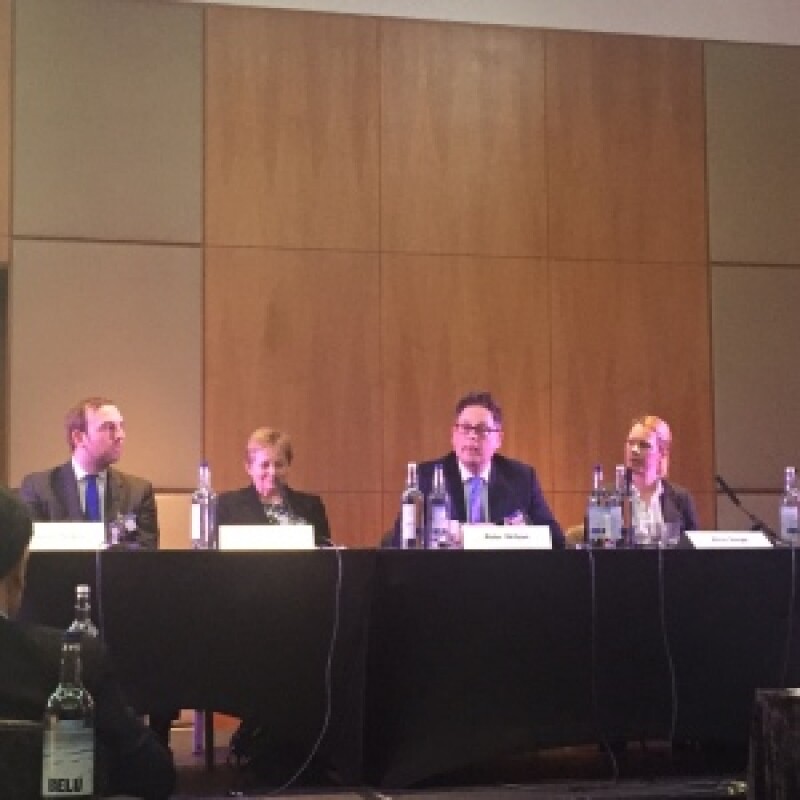
Carol Arnold of Shell stresses the need for everyone in a company (including notably IT and HR) to cooperate to maintain secrecy: internal training and education is key.
In trade secrets litigation, one of the challenges is: how to maintain the confidentiality? Thomas Farkas of Gowling WLG in Germany discusses possible solutions: the Düsseldorf Principle, staged proceedings, the black box procedure and deeming the trade secret not to be disclosed if revealed to an opposing parties during proceedings. It's not clear which if any of these align with the proposed Directive.
Another question concerns reverse engineering, says Alice Stagg of Gowling WLG. The Directive takes a different approach to English case law, she says, but the result might not be different.
Telecoms company BT has attempted to store and document trade secrets for non-patentable inventions, says senior patent attorney Peter Wilson. But he's not sure if the action taken would meet the "reasonable steps" requirement in the Directive. Wilson also queries whether trade secrets fit with a business model, which might sometimes require innovation to be shared publicly. "Understand your business model ... and make sure you use the right IP," he says.
During the Q&A we have a discussion about whether Germany or the UK is more pragmatic ...
14:25: China time!
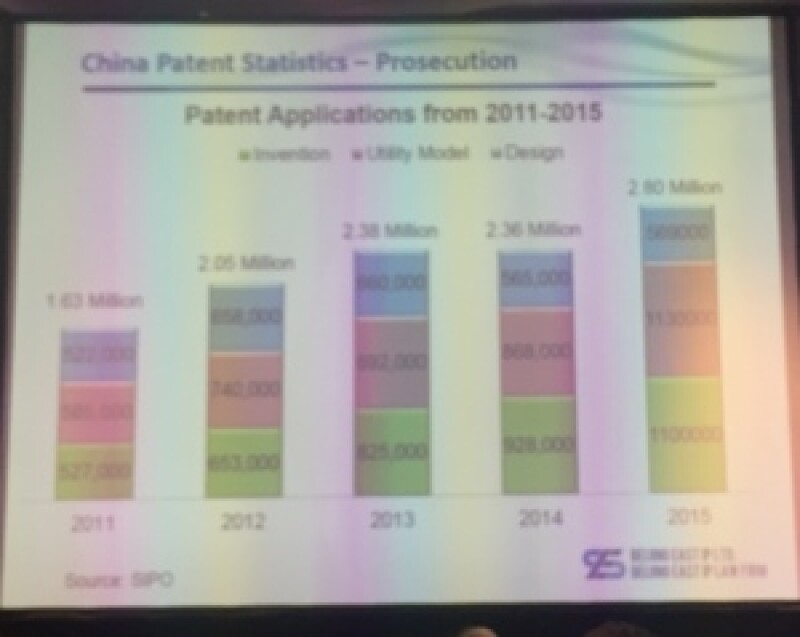
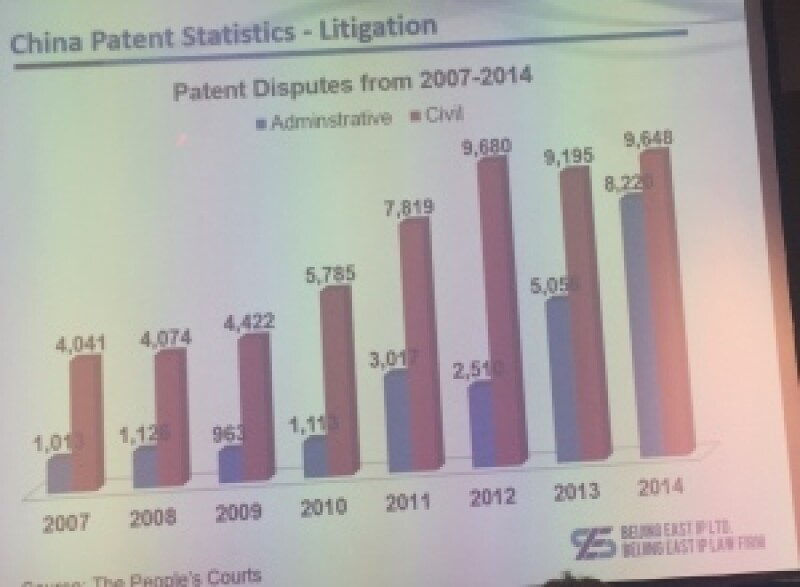
The annual China panel is always good for striking charts, and this year's revelation is that invention patent applications hit 1.1 million in 2015 with a similar number of utility model applications.
Lulin Gao of Beijing East IP has simple advice for all investors in the country: "Build up a strong patent portfolio in China ... You will meet strong competition in China."
And then we have a transparent (!) draw to win a glass bowl, courtesy of Adams & Adams.
13:50: Making money out of patents
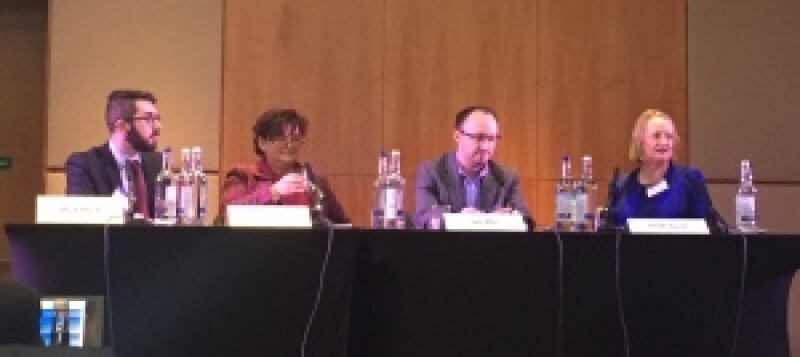
In a session on monetisation and commercialisation, Mark Marfe of Hogan Lovells identifies four phases in a patent monetisation strategy: 1. audit/analyse the portfolio, 2. analyse the market, 3. examine the business decision, 4. deployment.
Lyle Ellis of Vodafone discusses non-practicising entities and stresses the importance of maintaining relationships with customers and business partners: if you sell a patent for $1 million, but it could be asserted against one of your friends, is it worth the risk?
Elli Oxtoby has some fascinating case studies from QinetiQ, though she says she can't reveal the best stories due to defence sensitivities. The overall message is: Monetisation is not just about licensing and should be viewed from the view of the whole business.
13.00: Lunch!
12.30: The Turkish march
We have a panel discussing IP in Turkey. Ozge Atilgan Karakulak of Gün + Partners says there is progress (including a new draft law) but hopes it will not be like the famous Janissary March (one step forward, two steps back).
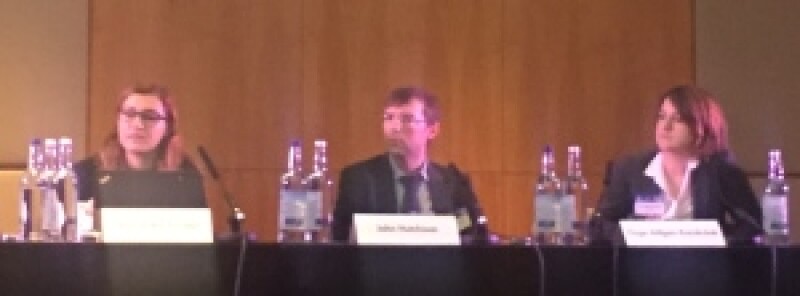
John Hutchison of Novartis says that Turkey compares with Europe in most respects, but there is no SPC protection and the data exclusivity is shorter - which means that litigation often occurs earlier in a product's lifecycle than elsewhere. Factor in difficulties in getting quick preliminary injunctions and in opposition proceedings and there are some hurdles to overcome in the country.
Selin Sinem Erciyas has some slides on the new Draft IP Law - specifically, one slide headed "Improvements" - these include post-grant opposition, removal of the non-examined system and clarifications on prior user rights and service inventions - and several more on what could have been included.
More news next year!
For more analysis, read our recently published IP in Turkey supplement.
12:00: Infringement of second medical use claims
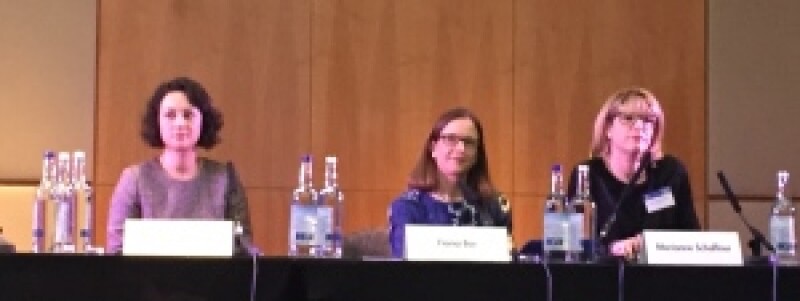
It's time to talk about carve outs, skinny labels and Swiss claims - the last of which will not expire in Europe until 2030, apparently.
Fiona Bar of Mereo BioPharma and Alpha Indraccolo of Teva Europe have the tricky job of explaining the many twists and turns of the pregabalin case.
Bar provides an update on the UK dispute, which is now again before the England and Wales Court of Appeal following eight (count them) judgments in the High Court. Indraccolo looks at the developments elsewhere in Europe: there have been proceedings in France, Italy, Germany, the Netherlands and Denmark (where Warner Lambert sued all 220 pharmacies in the country!).
Summary: it's a mess - the pharmaceutical industry's equivalent of Alice (as one speaker implied). Marianne Schaffner of Dechert discusses some means of tidying it up, spanning labelling, prescription behaviour and changes to the reimbursement system. "There are some solutions but no perfect solutions," she says.
11:20: Pravin answers back!
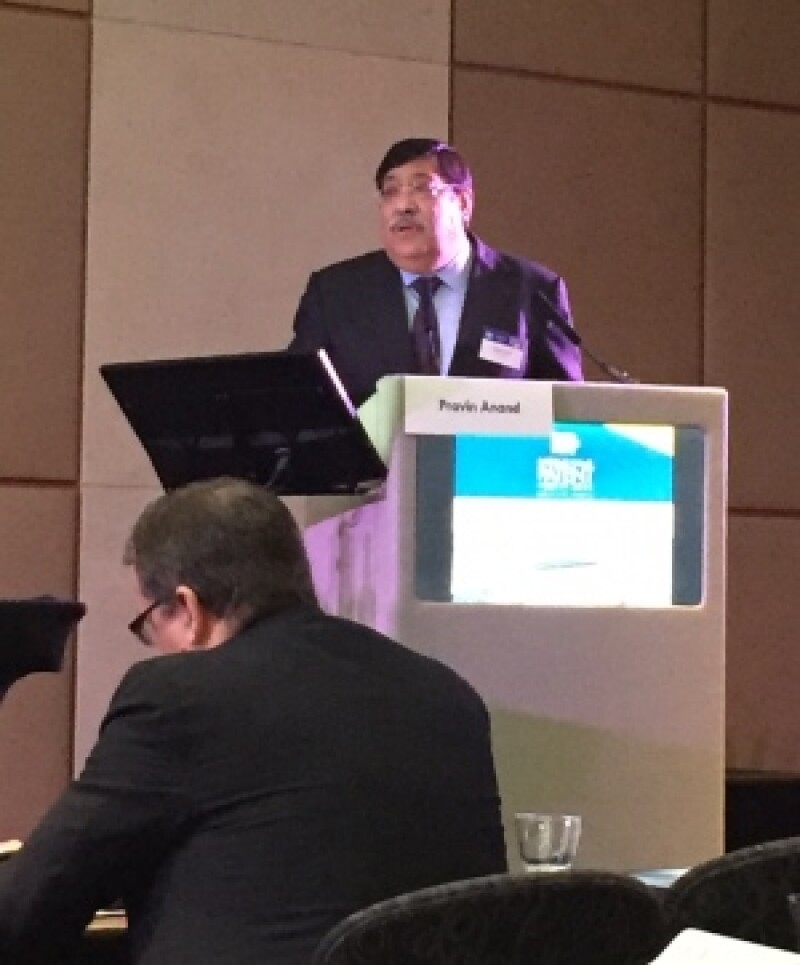
Gordon Harris introduces one of the best known brands in IP - Pravin Anand of Anand & Anand - who will discuss IP developments in India, and address some of the criticisms made by Patrick Kilbride earlier.
Anand introduces the concept of Jugaad and says India's National IPR Policy is "a very significant development". This will lead to more examiners (450 so far this year) and time limits being reduced by five years.
He acknowledges that the 2013 Novartis Glivec case involving Section 3(d) - novelty was "a big disaster" (Anand's firm acted for Novartis). But he says the picture on compulsory licensing is different: there have been five cases, of which only one was lost by the originator. More recently, there have been positive developments in the courts - both administratively (trials within one year) and substantively. Anand recommends reading the recent Roche and Merck cases which he calls "outstanding decisions" that "completely change Indian patent law" and also notes the Ericsson SEP litigation.
10.00: Patentable subject matter (again)
Adam Pilcher of Metaswitch Networks and Calum Smyth of Barclays are giving us some views from the trenches on filing and enforcing patents in the US post-Alice, in a session moderated by Philip Cupitt of Finnegan.
Pilcher confirms he has seen a rise in S101 objections, but says these can be overcome.with time and effort at the inventor capture stage, and if you can find good examples from the USPTO guidelines. But it is "a step-change in how we view the USPTO" he says - and in one case, he was in the surprising position of having a patent application granted in the UK, but refused in the US.
Smyth says challenging patents, including at PTAB, needs to be part of your strategy unless you assume that the patent will never be enforced - which he calls a bold position. Trade secrets, copyright (registered), and alternative business models (including open source) could all become more important.
Open source in particular presents challenges from a corporate perspective, says Smyth: "Developers are employed to be creative. Having a lot of burdensome hoops makes their job more difficult."
Time for coffee.
09:15: Patent enforcement strategies
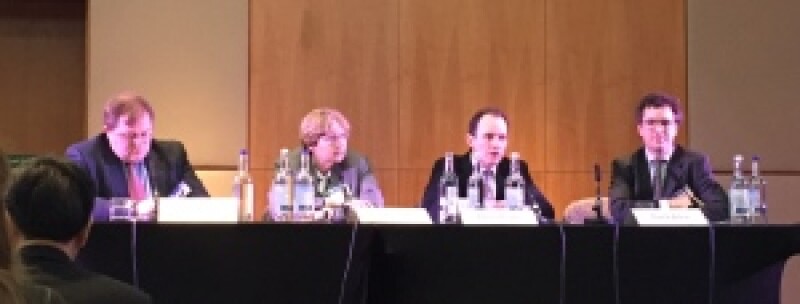
In a panel on patent strategy, Jody Giesser of DSM describes the patent filing strategy as "boringly practical" - based on markets, opportunities, competition and local laws. Enforcement considerations are normally secondary, she adds. Adrian Hawes of Nokia agrees but notes that any enforcement may be 10 years later than the patent filing, so you need to think ahead.
Giesser says one "groundshaking" change is that companies are now discussing whether to file a patent in the US - something that would never have been in doubt 10 years ago. Robert Carpmael of Marks & Clerk agrees, saying that clients have a diverse needs and for some Asia may be more important. Geisser compares patent strategy to having a collection of different tools, asking: "How do we have a tool shop that's wisely stocked?"
So what about enforcement? Hawes says Nokia's preferred means is arbitration, but it goes to court where necessary. The US has always been the number one forum for high-tech patent disputes, but is that changing? The US environment has become more challenging, while China's courts are improving. Will China's IP Court be the next rocket docket?
There's a question about Customs and the ITC, and one on the PPH.
09.00: Keynote - Patrick Kilbride, US Chamber of Commerce
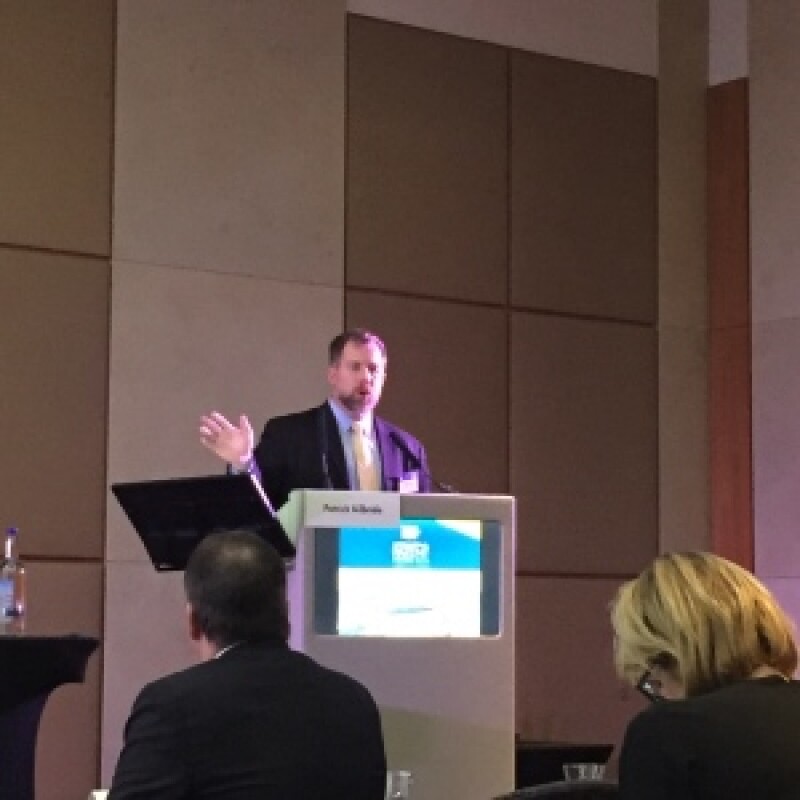
Patrick Kilbride introduces the 2016 GIPC Index, saying: "We all benefit from an IP system that users have confidence in" But he adds: "There is no one model. Every country is making its own decisions. India seems to have made a conscious choice to downgrade IP." By contrast, Malaysia is the top-ranked emerging market and is taking steps to encourage IP investment.
"A few small steps can pay big dividends in a country's ability to sell itself to foreign [IP] investors," he adds. The most important thing we as IP professionals can do is encourage all countries to develop a "clear, consistent, predictable set of rules" to develop a truly global innovative economy.
Q&A focuses on India, and how to define and encourage innovation. Note there's a session dedicated to India later this morning.
08:50: Gordon Harris, making his first public appearance as a partner of the newly merged Gowling WLG, is chairing today's Forum.
17.00: The IP-tax rollercoaster
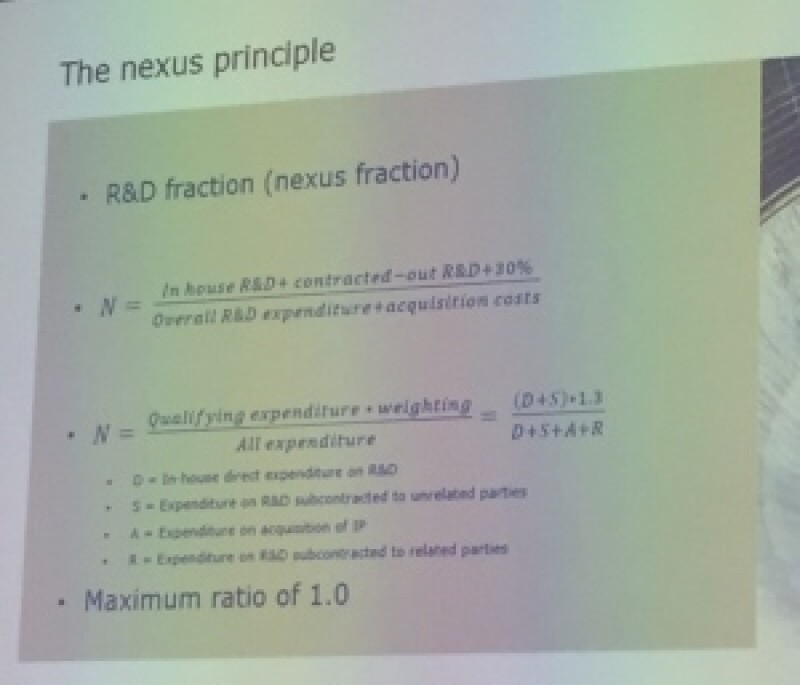
Russell Edson of Withers & Rogers promises to keep everyone awake during his presentation on tax, maths and accounting. (It's half an hour until the drinks reception.)
The UK's Patent Box attracted 639 UK companies up to the end of 2015, but was criticised by politicians including German Finance Minister Wolfgang Schäuble. Now it's being changed, and the changes come into effect on July 1 this year: the key point to remember is The Nexus Principle, which sounds like a Hollywood thriller but is actually a formula based R&D, acquisition costs and expenditure (AKA "track and trace", see image). There are various other complicated provisions, including a 15-year expenditure rule.
As moderator Andrew Hammond said: "You say this is designed to attract companies to come to the UK. Is that accounting companies?"
16.30: How long is an SPC?
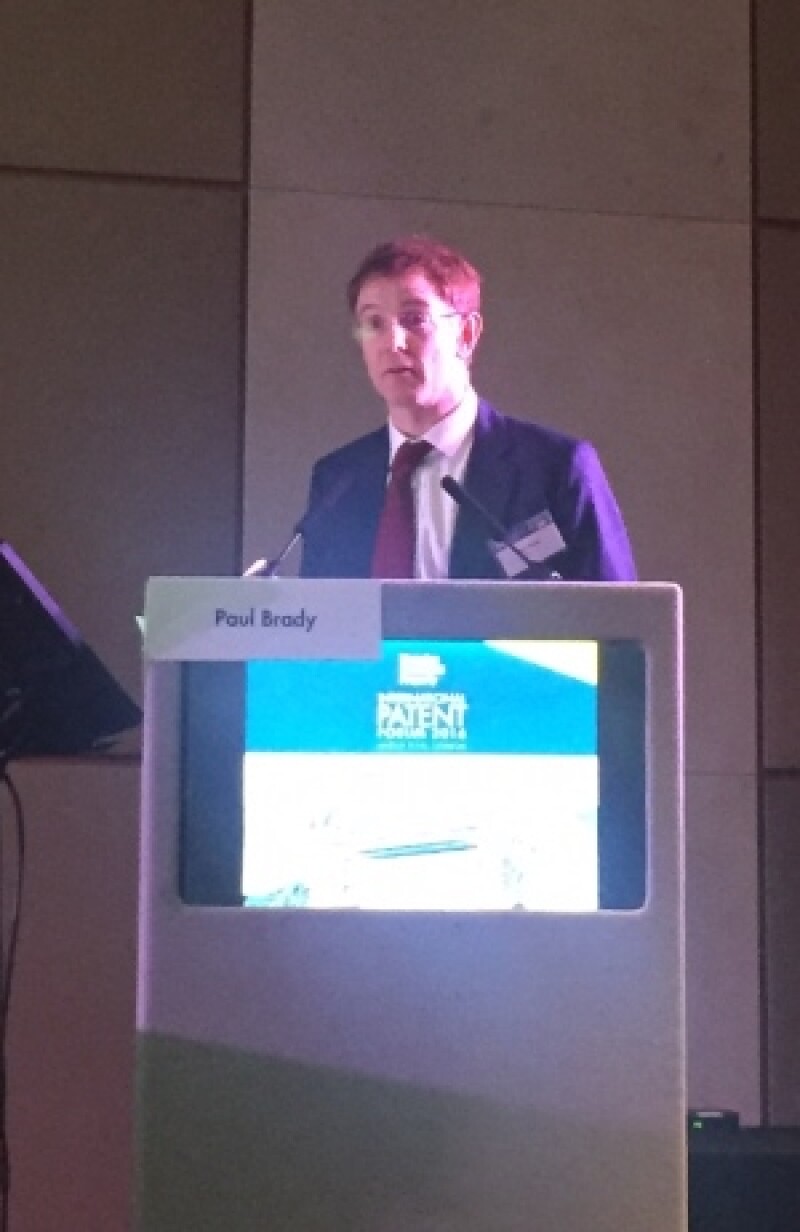
Paul Brady of Abel & Imray introduces the subject of SPCs - governed by a single EU Regulation, but granted nationally. They ought to be straightforward, but in practice are complex - not least when it comes to calculating the length of the term. The CJEU looked at a case regarding the length of term last year - Seattle Genetics C-471/14 - and specifically what happens when the date of authorisation and the date of notification are different. The Court ruled it was the latter, giving five extra days of protection in this case. The ruling is estimated to affect 400 to 500 SPCs, which could be extended by up to 12 days each - resulting in millions of dollars of extra revenue for patent owners.
Looking to the future, Brady mentions patent term extension provisions in the TPP, and the possibility of a single EU SPC title, which might address criticisms that the existing framework is "dysfunctional". He says that practitioners will likely welcome moves towards greater certainty but also warns: "Be careful what you wish for!"
16.00: Tea break!
15.20: Litigation - is it ever personal?

How do you effectively manage litigation? That's the question posed by David Por of Allen & Overy. Neil Trueman of Mundipharma says the key is communication - both internally and externally. Clemens Heusch of Nokia adds that identifying the target of the litigation is often the easy part; the challenge is how to reach that target, factoring in PR and investor as well as legal concerns.
It's not long before the evergreen topic of forum shopping comes up. Heusch disappoints all the litigators present by saying "litigation is never the preferred option" and points out you need to have validated patents in a jurisdiction, and you need a market of a certain size in order to have leverage. If you can tip the balance even a little bit in your favour in a particular jurisdiction, that can help force a settlement, says Trueman.
The panellists agree that evidence is key to the outcome of cases, but Pankaj Soni of Remfry & Sagar warns that rules and restrictions differ in different countries, and expectations should be managed accordingly. He adds that the X factor in emerging markets in Asia and Africa can be public interest "which you really cannot predict" and which governments don't know how to control.
And now we get on to ... judges. Are the stereotypes true? Are UK judges patent killers? Do their German counterparts want to bifurcate everything? Do judges (and juries) favour home teams? Let's say the panel's answers are diplomatic.
Por's intriguing final question concerns whether personal rivalries or tensions ever overcome the kind of rational decision-making hitherto discussed. Soni says don't underestimate business rivalry and the desire "to teach the other guy a lesson". Even if it doesn't start out with a personal element, says Trueman, that may develop once things escalate. And there may be commercial value in having a litigious reputation, which can deter competitors.
14.30: IP in Africa
Dario Tanziani of Adams & Adams is rating African countries for their patent searching. He "reluctantly" awards Angola 0/10. Nigeria gets 4/10, ARIPO 7/10 and OAPI also 7/10. Top of the class South Africa scores 10/10 thanks to its online search facility
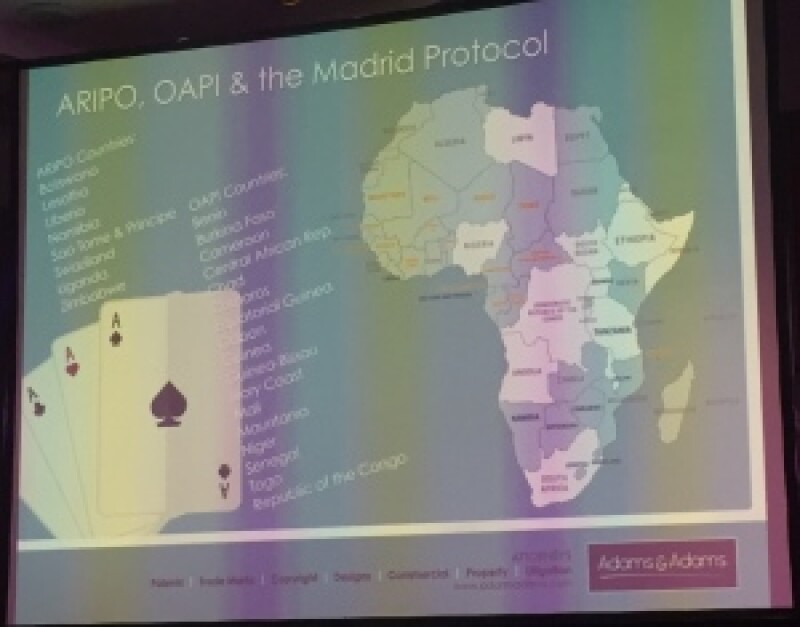
Turning to trade marks, Megan Moerdijk describes using the Madrid System in Africa as a "gamble". In some countries, she says, you can wait 10 years for a mark to be advertised. Classification is a problem in many countries where the list of goods and services dates back to 1938. Her takeaway: stick to the national systems. Pieter van den Bulck of SABMiller says his company recognises the benefits of the Madrid System, and has some 120 international registrations. But it does not use it in Africa yet, and will not do so until countries properly implement the system.
Finally, Danie Dohmen of Adams & Adams provides an update on recent cases, including a victory for Nestle whose shape trade mark for Kit Kat was held to be valid and infringed in South Africa, the Mr Price case in Nigeria and the Weetabix v Multibix case in Kenya. He also sets out the current state of the controversial IP Policy, which affects pharma patents.
If you're interested in IP in Africa, consider attending our dedicated forum in New York on April 6.
13.30: It's been a long morning, but now time for lunch. We'll be back in about an hour!
13.00: Trends in Russian litigation
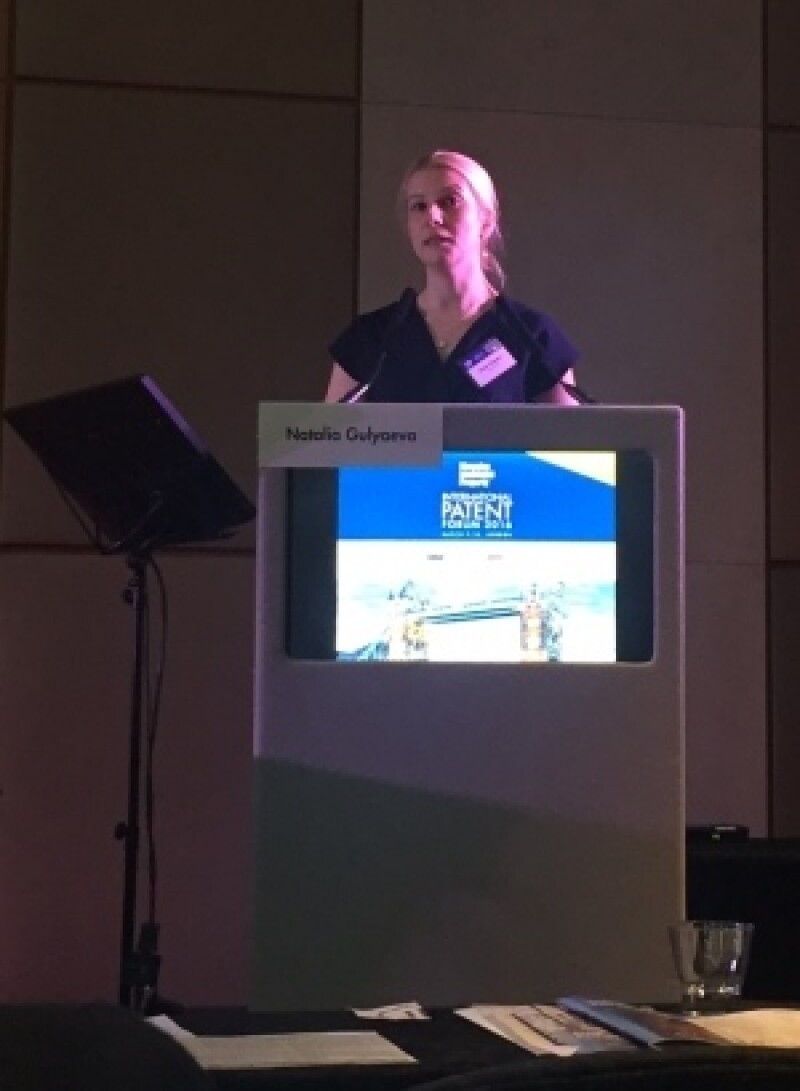
Natalia Gulyaeva of Hogan Lovells Moscow is explaining four trends in Russia's new IP Court: 1. Mandatory pre-trial procedure, effective from June 1 2016 there must be a 30-day delay before bringing an infringement action; this increases the risk of a revocation action being brought.
2. Remote hearing: since January 15, you can "attend" a PTO hearing by videoconference without leaving home! You can also take part in a court hearing by videoconference at any Russian court.
3. Increasing role of expert witnesses: In Russia, there are expert, specialist and distinguished scholar witnesses - and different rules apply to each (the latter is unique to the IP Court).
4. Involvement of business representatives: welcomed by the IP Court.
Recent cases at the IP Court have clarified its approach to the limitation period, service inventions and patent licence agreements.
12.25: PTAB time! Post-grant proceedings at EPO and USPTO compared.
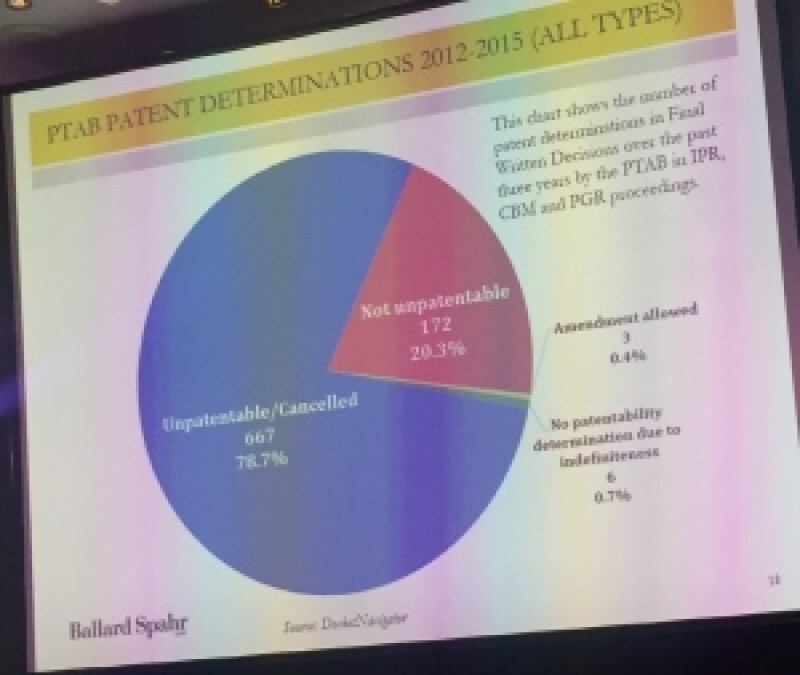
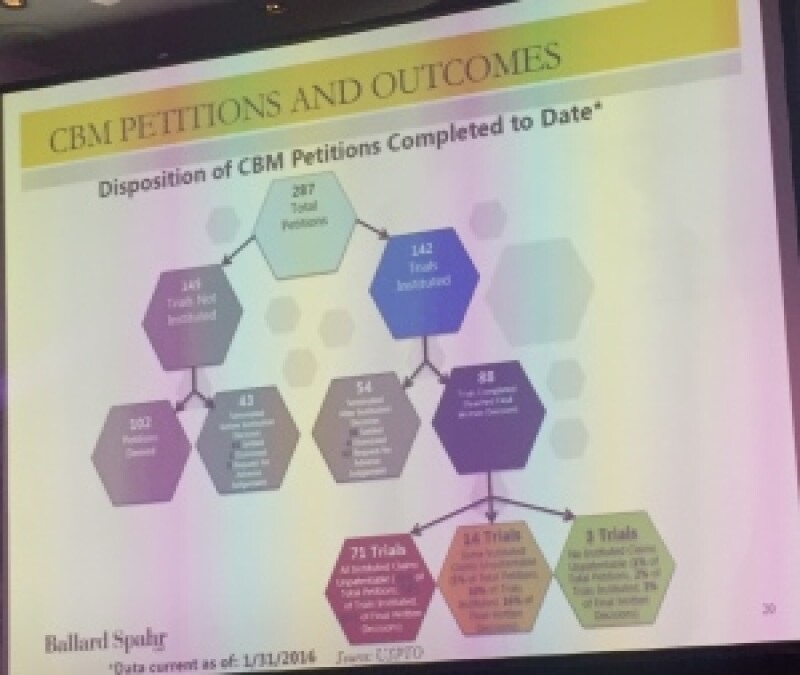
Brian LaCorte of Ballard Spahr starts by apologising on behalf of the US for ... Donald Trump!
At PTAB, says LaCorte, institution is all-important: if your case is instituted, your chances of success are very high (80%+). Time limits should be observed. He mentions CBM review, noting that the PTAB has so far taken a broad approach to patents eligible for this proceeding.
He advises not going for a "home run" but targeting certain claims in PTAB proceedings, and has some striking statistics about success rates. It's vital to get the petition right, he says: this is your best chance of success, and of getting a favourable settlement.
Benjamin Hoffmann of Valea contrasts the EPO system: costs are lower, evidence is more limited, timeline is longer (10 years or more including appeal) and the EPO can continue the opposition even if the opponent withdraws - which can be a nasty experience for the patent applicant. One advantage at the EPO is you can retain anonymity (straw man appeals).
See all Managing IP's PTAB coverage at managingip.com/ptab. We published an article with data on EPO oppositions last year.
11.30: Software patents - Europe versus USA (MIP prediction: home win)
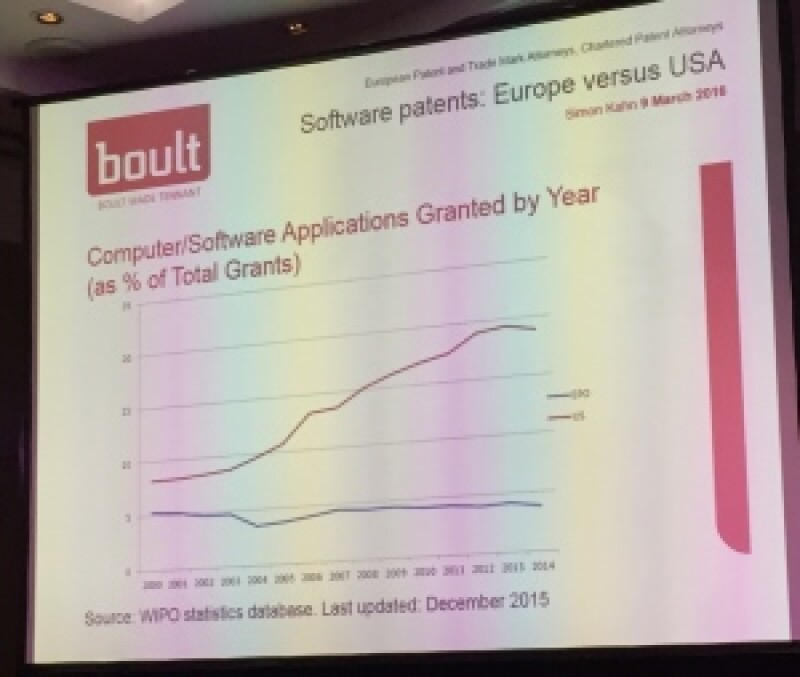
We're starting off talking about Alice with Alice (Hume, of Qlik) who says that applicants have to work a lot harder before the USPTO since the Supreme Court's decision. Rosie Stoakes of Glory Global Solutions agrees that life is tougher, and there is a bit more uncertainty now in the US, but says a US patent is still worth the effort - even if cuts have to be made elsewhere. Kevin Fournier of IBM says: Expect an Alice attack every time you file an application or assert a patent: "The first thing you think about is no longer the prior art, it's Alice."

Are things more settled in Europe? Yes, says Stoakes, but there is uncertainty around enforcement in the UPC: will UPC judges follow the settled EPO Boards of Appeal case law? The predictability at the EPO means you can pick your battles, and decide where to invest, says Fournier. In summary, there's broad support from this panel for the EPO approach to software patents. Turning back to Alice, Fournier says the test is very hard to apply: Is there an abstract idea? Is there substantially more? He discusses the DDR Holdings case (summarised here). Stoakes says the USPTO guidelines are very helpful, and should be used to challenge the examiner. "Make sure your analogy is foursquare with the example you have selected," she adds.
The panel also recommend examiner interviews at the USPTO, especially pre-first office action interviews.
Simon Kahn of Boult Wade Tennant is doing a good job of moderating this panel, asking some tricky questions, eg: Would you rather have a narrow but solid patent or a broad but weak one? Are you now filing in Europe before US? And what does the future hold? The panel are all optimistic: the number of software applications will fall but granted patents will be more enforceable; certainty will increase; and in the US, either Congress or the Supreme Court will clarify matters soon.
Tricky question from the audience: how do you define a software patent? Oh look ... it's time for the next panel!
11.00: Coffee break. It's a bit chilly in the room and everyone needs to warm up!
10.10: Alex Brodie of Gowling WLG introduces the next panel on licensing in TMT (don't mention the F word - FRAND!)

Earl Nied of Intel predicts the internet of things will have a big impact: small companies will come up with innovative successful products. Kerry Miller of Nokia says after the Huawei decision there will be more focus on the implementers of standards and how they have to behave. Dan Hermele of Qualcomm describes the debates over standard-essential patent as critical for IP as a whole, and for technology development. IoT will require platforms and open standards and need for investment in those technologies, he says, and standards is the way to do that.
Miller predicts licences will become more "cookie-cutter", as licensing becomes commonplace, and Hermele agrees licensing will need to evolve, but says the market will respond. Brodie asks whether the music industry collective licensing model provides an example?
The panel are discussing the tension between portfolio licensing and patent-by-patent, claim-by-claim analysis, and how best to ensure - as Roberto Dini of Sisvel emphasises - that innovators are rewarded. They also debate why patent pools don't always work for tech companies. Questions from the audience address valuation and patent quality.
They didn't succeed in getting through the 50 minutes without mentioning the F word, by the way. And there was a discussion about the sex of angels ...
09.25: The first panel is on the UPC. Mark Ridgway of Allen & Overy asks the big question: will it lead to greater legal certainty?
Stefan Luginbuehl of the EPO gives an update on the Unitary Patent, the EPO's new responsibilities and the fees.
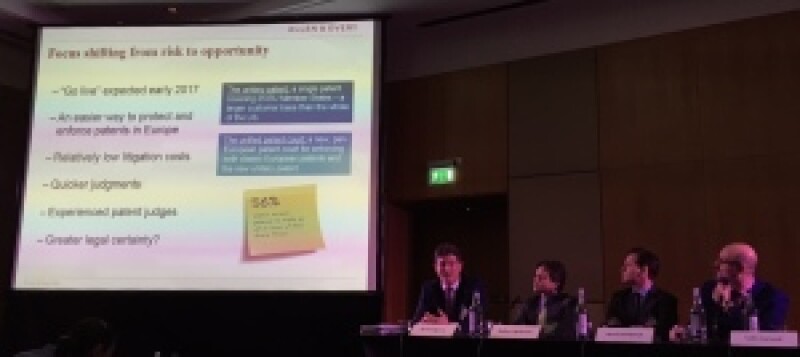
Remaining questions to be decided include: the introduction of a unitary SPC which he describes as difficult legally and politically; payment for validation and renewal if a request for unitary effect is rejected; and double protection by a unitary patent and classical European patent, which is left to national law makers. Mark says the zero fee for opt-out (and for opting back in) and the possibility of bulk opt-outs is good news for those who want to "sit outside the system and observe".
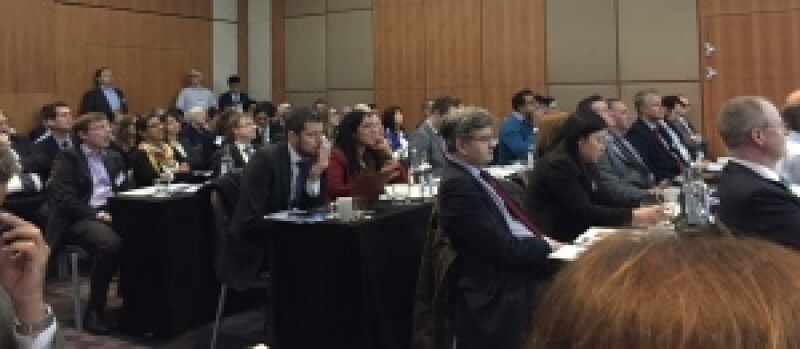
Colin Lamond of Nissan says it's good for industry to know what the renewal, opt out and court fees are but "it's too early to tell" how they will affect behaviour.
Mark Chadwick of DSM says the fixed fees "make the court very attractive" and the costs are comparable to the US, even for revocation.
Joachim Feldges reveals the judges' pay and conditions, and invites expressions of interest from the audience!
The discussion moves on to double patenting of national and Unitary patents. "The more options you have, the better for the patentee," says Colin Lamond. But the panel agree that in practical terms, it will be rarely used.
"How long will it take to establish trust in the system? How is it gained? The short answer is: get involved, but the risks of an unproven system might be too much. I would like to shape the system, but there's also a business case not to get involved," says Lamond.
Chadwick says it is key that the judges do an exceptional job at an early stage "and I absolutely believe they will". He identifies enablement and matters of evidence as key issues to grapple with for the life sciences industry.
See our dedicated page for lots more detail on the Unitary Patent and UPC.
09.00: Keynote speech - Rosa Wilkinson of UK IPO.
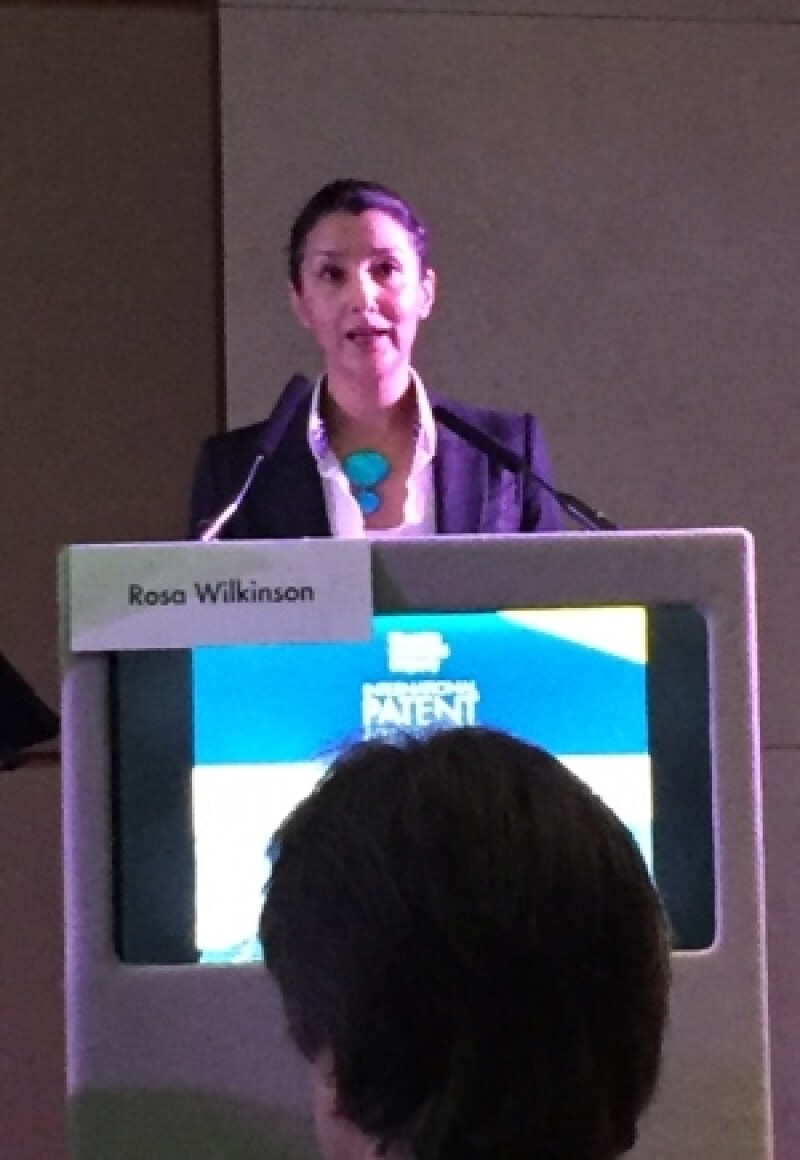
Rosa describes why governments are interested in IP: they want to see robust, sustainable economic growth, and that means thinking about how well IP systems support innovators. She calls it "the birth of an age when IP began to enjoy a stronger spotlight within government policy". She mentions Canada, China, Brunei (which has set up its own IPO) and international frameworks such as the patent prosecution highway, patent harmonisation and cross-border intelligence sharing. "The pace of change shows no sign of slowing."
She adds the UK government wants to see "real, relevant progress" on improving the patent system, mentioning UK IPO head John Alty's leadership of the B+ group. But she warns that too often firms are "blinkered" in their use of IP assets, and don't fully exploit them, and there is "a vast gulf" between business strategy and IP management: in a survey, 92% of businesses said it was important to protect IP, only 52% said they had done so and just 4% had tried to put a value on their IP.
"You can make the change happen," she tells the audience.
Follow Rosa on Twitter.
08.50: Andrew Hammond of Valea opens the Forum with a summary of how patents have changed in 25 years (the lifetime of Managing IP) - from Eastman Kodak to Huawei. He also highlights some of the emerging themes being discussed at the Forum - the UPC, FRAND, PTAB, SPCs and issues in the IT and telecoms industries.
He adds that "a less favourable development last year" was the political turmoil at the EPO, and the 30 unfilled posts in the EPO Boards of Appeal, leading to significant delays. "It would be a shame if internal bickering was to the detriment of the users of the patent system," he says.
Updates will be posted here during the Forum on March 9 and 10. Please check back then.










